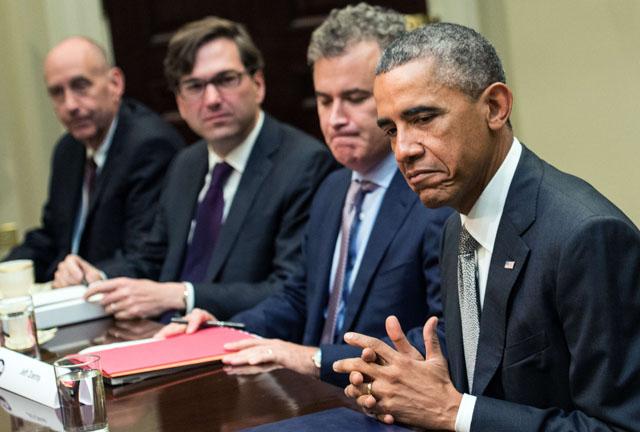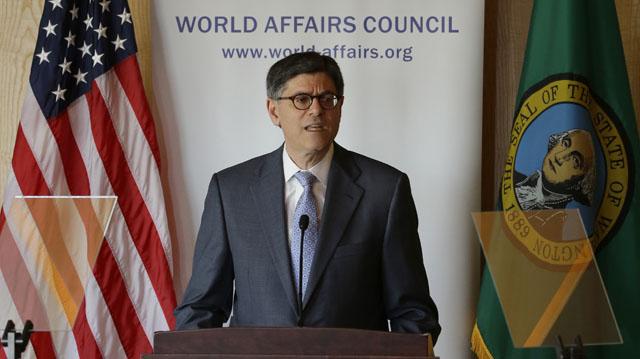You are here
US warns Europe on deflation, says ECB actions may fall short
By Reuters - Oct 16,2014 - Last updated at Oct 16,2014
WASHINGTON — The United States on Wednesday renewed a warning that Europe risks falling into a downward spiral of falling wages and prices, saying recent actions by the European Central Bank (ECB) may not be enough to ward off deflation.
In a semi-annual report to Congress, the US Treasury Department also said Berlin could do more to help Europe, namely by boosting demand in the German economy, Europe's largest.
"Europe faces the risk of a prolonged period of substantially below-target inflation or outright deflation," the treasury said.
The ECB in recent months has cut interest rates to record lows, offered banks new long-term loans, and announced plans to buy private sector assets.
All this is intended to prop up a eurozone economy teetering on the edge of recession. Europe is a major trading partner for the United States and China, and its travails have been at the centre of worries over the global economy that have shaken financial markets worldwide in recent days.
The US treasury said the ECB's actions "should help combat deflationary risks", but that "further policy support for demand may be needed”.
The report appeared carefully worded to avoid sounding pushy over what Washington thinks Germany should do. Berlin has been a key American ally for decades.
Still, the Obama administration sees Germany as a missing link in Europe's elusive recovery from what in many corners of the continent has looked like an economic depression.
"Measures to increase domestic demand, particularly in surplus countries like Germany, can help further European and global rebalancing," the treasury said. In its last report to Congress in April, it had also warned that Europe faced the risk of deflation.
Germany, which has sought to keep the focus in Europe on fiscal austerity, came under a spotlight at meetings last weekend of finance officials from around the globe who sought to convince Berlin to loosen its purse strings.
The Treasury Department also took South Korea to task for intervening in foreign exchange markets. The won has weakened 5 per cent against the dollar in six weeks.
The Obama administration has long called on Seoul to minimise currency interventions, but on Wednesday it said outright that the won was "undervalued," and urged Seoul to let it appreciate further.
Washington again called China's currency "significantly undervalued," but said Beijing appeared to be taking less of a hand in determining the yuan's value. This suggests tensions between the two powers over currency policy might be easing.
The semi-annual report examines the economic and foreign exchange policies of major US trading partners. It did not formally label any country a currency manipulator, and has not done so in any report since 1994.
Separately, the Treasury Department said this week that the US budget deficit fell by nearly a third to $483 billion in fiscal 2014, the lowest level since 2008, as a quickening economic recovery boosted tax collections and spending grew only modestly.
The deficit, down from $680 billion last year, was the lowest since a $459 billion budget gap in fiscal 2008, which was followed by four straight years of $1 trillion-plus deficits in the wake of the financial crisis.
Treasury Secretary Jack Lew and White House Budget Director Shaun Donovan hailed the data on Wednesday as a "return to fiscal normalcy" as the 2014 deficit fell to 2.8 per cent of the gross domestic product. That was the lowest since 2007 and a smaller share of the economy than the annual average for the last 40 years.
Lew told a news conference the United States was now in a period of fiscal sustainability that is providing a strong foundation for growth.
"What I don't think we have is an emergency right now," Lew said. "The challenge we have is to sustain the economic engine so that we're seeing the growth now and over these next 10 years."
The improving fiscal picture has sapped the urgency for a major budget deal between Congress and the White House aimed at slashing deficits by trillions of dollars over the next decade and starting to reduce the $17.8 trillion federal debt.
Lew insisted he has not given up on further deficit reduction, but said budget savings could not come at the expense of economic growth.
Both Lew and Donovan said growth and revenues in 2014 were helped by the easing of across-the-board budget cuts that went into effect last year, along with the lack of a fiscal crisis such as last year's federal government shutdown.
Donovan told Reuters on Tuesday he wanted to further reduce those budget cuts next year and would be willing to consider some savings to mandatory spending programmes to reach a deal with Republicans, who control the US House of Representatives.
Fiscal 2014 revenues grew 9 per cent to $3.02 trillion, boosted by a jump in individual and corporate tax receipts and a 31 per cent rise in Federal Reserve earnings, mostly from the central bank's massive bond portfolio.
Outlays grew just 1 per cent to $3.50 trillion.
For September, the treasury recorded a budget surplus of $106 billion, up from a year-ago surplus of $75 billion. Analysts polled by Reuters had expected a $80.9 billion surplus for the final month of fiscal 2014.
Receipts last month grew 17 per cent to $352 billion while outlays were up 9 per cent to $246 billion.
The Congressional Budget Office (CBO) has forecast a $469 billion deficit for fiscal 2015, which started on October 1. It expects deficits to rise again later this decade as costs associated with an ageing population mount.
"A nearly $500 billion deficit is nothing to celebrate," said a spokesman for House Budget Committee Chairman Paul Ryan, a Republican who has been touted as a possible 2016 presidential candidate. "And CBO still projects that, in the coming years, the deficit will rise even higher to unsustainable heights."
Related Articles
US Treasury Secretary Jacob Lew warned the eurozone this week to pay heed to the risk of deflation, adding pressure on European authorities and the European Central Bank (ECB) to boost growth.
President Barack Obama urged top US market regulators this week to look for ways to tailor rules based on financial firms' size and complexity.
The United States on Wednesday stepped up calls on European policy makers to do more to avoid a "lost decade" of low growth, saying steps taken by the European Central Bank (ECB) may not be sufficient on their own.













